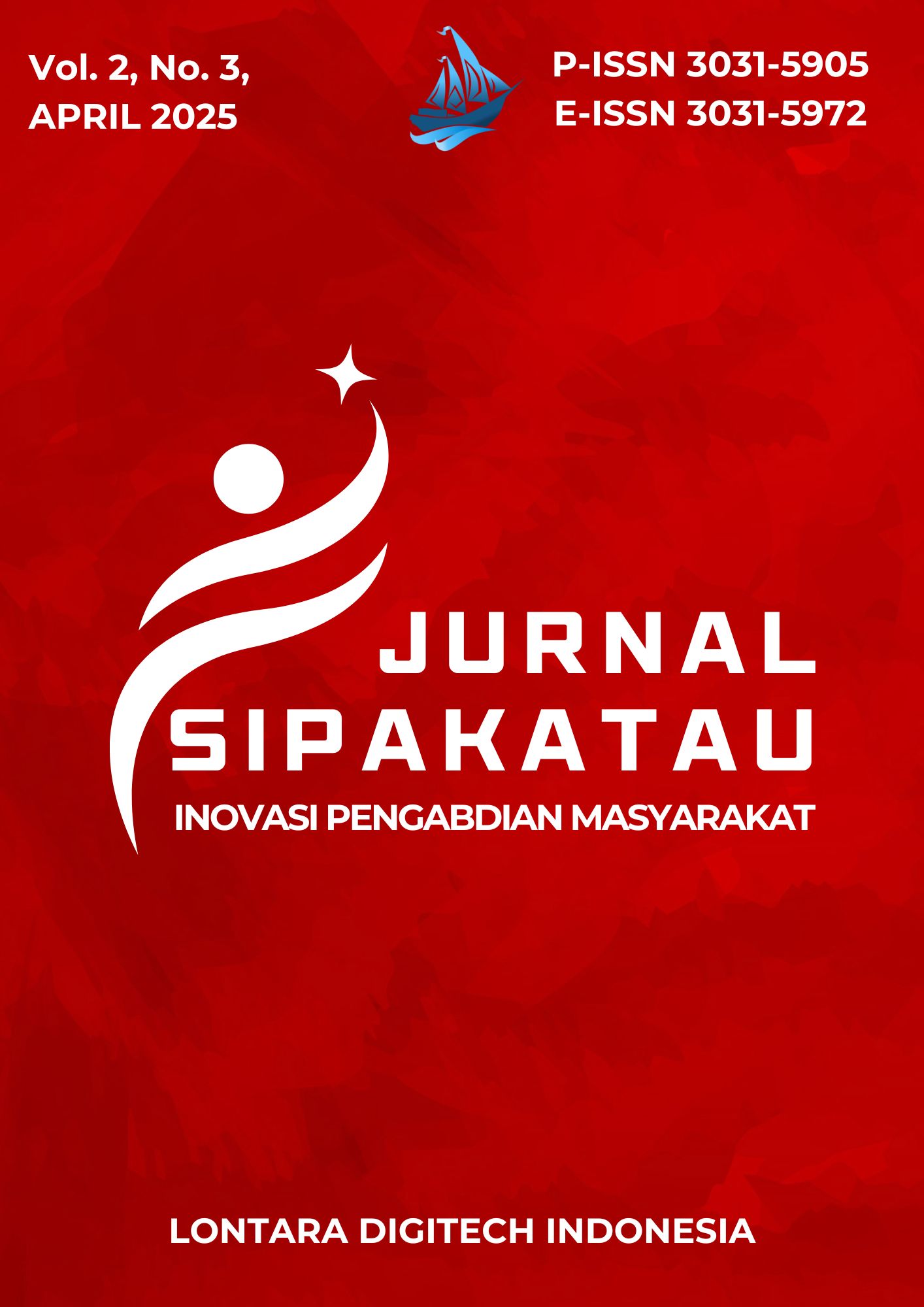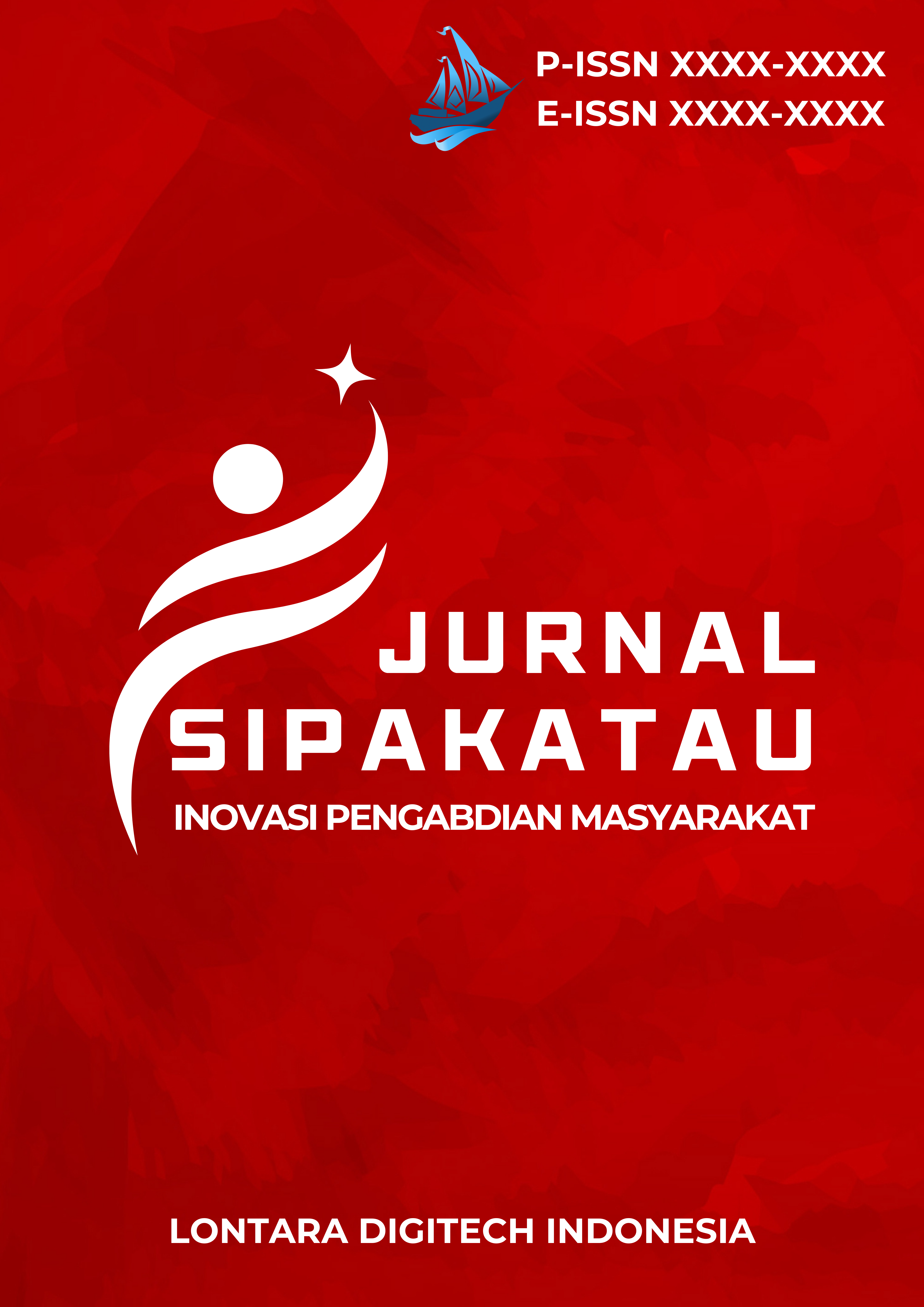Strengthening the Innovation Capacity of Student PKM Proposals through an AI-Generative-Based Co-Creation Learning Model with a Classroom Action Research Approach
DOI:
https://doi.org/10.61220/jsipakatau.v2i3.2514Keywords:
Artificial Intelligence, Classroom Action Research, Co-Creation Learning, Project Based Learning, Student Creativity ProgramAbstract
The low quality of student innovation in preparing Student Creativity Program (PKM) proposals remains a challenge in higher education, caused by limited research experience, weak team collaboration, and low utilization of Artificial Intelligence (AI) technology. This study aims to describe the implementation of an AI-based Co-Creation Learning model in improving students' abilities to prepare PKM proposals. This research used the Classroom Action Research (CAR) method, which was conducted in two cycles: the first cycle applied the Project-Based Learning (PjBL) model, and the second cycle applied the AI-based Co-Creation Learning model. The results showed an increase in the students’ average scores from 86.1 in the first cycle to 88.4 in the second cycle, with a decrease in the standard deviation from 2.32 to 1.37. Inferential analysis using a paired samples t-test revealed a t-value of -9.25 with p < 0.001 and an effect size (Cohen’s d) of -1.46, indicating a statistically significant improvement in learning outcomes. This model effectively supports collaboration, creativity, and students' skills in developing more relevant PKM proposals. Thus, the implementation of the AI-based Co-Creation Learning model is effective in enhancing students’ innovation capacity and supports the Merdeka Belajar Kampus Merdeka policy in strengthening excellent human resources in the digital era.
References
Agusnaya, N., & Nirmala, P. (2024). Fundamental and Applied Management Journal Skala Literasi AI terhadap Prestasi Belajar Mahasiswa dalam Konteks Pendidikan Level Perguruan Tinggi di Era Digital. 2(2). https://doi.org/10.61220/voice
Akhilesh, K. (2017). Co-Creation and Learning. 45–54. https://doi.org/10.1007/978-81-322-3679-5_2
Arwih, M. Z., Mongsidi, W., & Marsuna, M. (2024). Sosialisasi Teknik Penulisan Artikel Ilmiah dan Proses Submission pada Mahasiswa Jurusan Ilmu Keolahragaan FKIP Universitas Halu Oleo. Lumbung Inovasi: Jurnal Pengabdian Kepada Masyarakat. https://doi.org/10.36312/linov.v9i1.1434
Doyle, E., Patrick, B., & and Whelan, J. (2019). Assessment co-creation: an exploratory analysis of opportunities and challenges based on student and instructor perspectives. Teaching in Higher Education, 24(6), 739–754. https://doi.org/10.1080/13562517.2018.1498077
Fadhilatunisa, D., Fakhri, M. M., & Rosidah, R. (2020). Pengaruh Blended Learning Terhadap Aktivitas Belajar Dan Hasil Belajar Mahasiswa Akuntansi. Jurnal Pendidikan Akuntansi Indonesia, 18(2), 93–106.
Fakhri, M. M., Kurnia Prima Putra, Dary Mochamad Rifqie, Nur Annafiah, Pramudya Asoka Syukur, & Arsyanda. (2024). School Community Empowerment through Artificial intelligence and Augmented reality Literacy at SMAN 2 Barru. Mattawang: Jurnal Pengabdian Masyarakat, 5(3), 94–103. https://doi.org/10.35877/454RI.mattawang2986
Hasni, H., Malik, E., Agustyawati, D., Daholu, A., & Rusdin, R. (2022). SUKSES SKRIPSI MELALUI SOSIALISASI PEDOMAN PENULISAN SKRIPSI PADA MAHASISWA FAKULTAS EKONOMI UNIVERSITAS MUHAMMADIYAH BUTON. Journal of Community Empowerment. https://doi.org/10.31764/joce.v1i1.9549
Ilmudinulloh, R. (2022). Model Pembelajaran Berbasis Proyek untuk Mengembangkan Kemampuan Berpikir Kritis Mahasiswa. Jurnal Riset Jurnalistik Dan Media Digital. https://doi.org/10.29313/jrjmd.v2i2.1366
Jarke, J. (2020). Learning from Co-creation Practice. Public Administration and Information Technology. https://doi.org/10.1007/978-3-030-52873-7_8
Kaminskienė, L., Žydžiūnaitė, V., Jurgilė, V., & Ponomarenko, T. (2020). Co-creation of Learning: A Concept Analysis. European Journal of Contemporary Education, 9, 337–349. https://doi.org/10.13187/ejced.2020.2.337
Khasinah, S. (2013). CLASSROOM ACTION RESEARCH. In Jurnal Pionir (Vol. 1, Issue 1).
Könings, K. D., Serge, M., Frank, S., Laurents, S., & and Ramani, S. (2021). Learner involvement in the co-creation of teaching and learning: AMEE Guide No. 138. Medical Teacher, 43(8), 924–936. https://doi.org/10.1080/0142159X.2020.1838464
Lee, G.-G., Mun, S., Shin, M.-K., & Zhai, X. (2023). Collaborative Learning with Artificial Intelligence Speakers (CLAIS) : Pre-Service Elementary Science Teachers’ Responses to the Prototype.
M, J., Ahyuna, A., Suradi, A. A. M., Arifin, A., Akhriana, A., Sy, H., Djafar, I., Rizal,
M., Piu, S., & Arifin, S. (2024). Optimisasi Proses Pembelajaran di SMAN 6 Barru: Peningkatan Kualitas Pendidikan melalui Tata Kelola Nilai Siswa dan Bahan Ajar yang Efektif. Abditeknika Jurnal Pengabdian Masyarakat. https://doi.org/10.31294/abditeknika.v4i1.3096
Majdi, M. (2023). Inovasi Pembelajaran Abad 21: Peluang dan Tantangan Implementasi Kurikulum Merdeka Belajar di Kampus Merdeka Belajar pada STIT Buntet Pesantren Cirebon. JIECO: Journal of Islamic Education Counseling. https://doi.org/10.54213/jieco.v3i1.254
Maulana, A. (2022). Implementasi Kebijakan Merdeka Belajar Kampus Merdeka (MBKM) Dalam Mewujudkan SDM Unggul dan Kompetitif di Perguruan Tinggi (Berdasarkan Survey SPADA di Universitas Muhammadiyah Jakarta Tahun 2022). Al-Qisth Law Review. https://doi.org/10.24853/al-qisth.6.1.1-21
Maya, H. R. R. (2024, August). Enhancing Academic Creativity: Co-Creation and Artificial Intelligence. Proceedings of the 10th World Congress on Electrical Engineering and Computer Systems and Science. https://doi.org/10.11159/cist24.178
Michael, G. (2024). The Impact of Generative Artificial Intelligence on Ideation and the performance of Innovation Teams (Preprint).
Miftach Fakhri, M., Fadhilatunisa, D., & Rahmah Sari, N. (2022). THE USE OF THE EXTENDED TECHNOLOGY ACCEPTANCE MODEL (TAM) TO MEASURE BEHAVIORAL INTENTION USERS OF ZAHIR ACCOUNTING SOFTWARE.
Monita, E. (2016). UPAYA MENINGKATKAN KETERAMPILAN MENULIS KARANGAN DESKRIPSI MELALUI STRATEGI MENULIS TERBIMBING PADA SISWA KELAS IVB SD NEGERI CEPIT SEWON. Basic Education, 5, 424–434. https://consensus.app/papers/upaya-meningkatkan-keterampilan-menulis-karangan-monita/436634ea5f8055369024ac65fb76c97a/
Pozdniakov, S., Brazil, J., Mohammadi, M., Dollinger, M., Sadiq, S., & Khosravi, H. (2025). AI-Assisted Co-Creation: Bridging Skill Gaps in Student-Generated Content. Journal of Learning Analytics, 12(1), 129–151. https://doi.org/10.18608/jla.2025.8601
Prabowo - Gibran. (2024). Visi Misi dan Program Kerja Calon Presiden dan Wakil Presiden 2024–2029.
Putra, P. B. K., Bagia, M., & Yudiaatmaja, M. S. . F. (2017). ANALISIS MENURUNNYA KINERJA PROGRAM KREATIVITAS MAHASISWA (PKM) HIBAH DI JURUSAN MANAJEMEN UNDIKSHA(Sebuah Kajian Dari Perspektif Manajemen Sumber Daya Manusia). 7. https://consensus.app/papers/analisis-menurunnya-kinerja-program-kreativitas-putra-bagia/9a413c5688d25955b39e2b816d8b0e73/
Rachmawati, R., Sari, D., & F. Rodelas, A. N. (2024). Implementing Integrated Reporting to Disclose Intellectual Capital in University. Owner, 8(2). https://doi.org/10.33395/owner.v8i2.2328
Ruslan, R., Lu’mu, L., Fakhri, M. M., Ahmar, A. S., & Fadhilatunisa, D. (2024). Effectiveness of the Flipped Project-Based Learning Model Based on Moodle LMS to Improve Student Communication and Problem-Solving Skills in Learning Programming. Education Sciences, 14(9). https://doi.org/10.3390/educsci14091021
Sumarlin, Naatonis, R. N., & Anggraini, D. (2024). PEMBELAJARAN ADAPTIF BERBASIS SISTEM CERDAS UNTUK MENINGKATKAN KEMAMPUAN BERPIKIR KRITIS MAHASISWA DI PERGURUAN TINGGI. HOAQ (High Education of Organization Archive Quality) : Jurnal Teknologi Informasi. https://doi.org/10.52972/hoaq.vol15no2.p136-145
Susilowati, D. (2018). PENELITIAN TINDAKAN KELAS (PTK) SOLUSI ALTERNATIF PROBLEMATIKA PEMBELAJARAN. 2. https://doi.org/10.29040/JIE.V2I01.175
Utomo, P., Asvio, N., & Prayogi, F. (2024). Metode Penelitian Tindakan Kelas (PTK): Panduan Praktis untuk Guru dan Mahasiswa di Institusi Pendidikan. Pubmedia Jurnal Penelitian Tindakan Kelas Indonesia, 1(4), 19. https://doi.org/10.47134/ptk.v1i4.821
Virliana, A. I., & Fauziah, L. S. N. (2025). Pengaruh Pembelajaran Kolaboratif untuk Meningkatkan Cara Berpikir Kritis. JURNAL JENDELA PENDIDIKAN.
Yusuf, N. (2024). The Role of Artificial Intelligence in Improving the Quality of Student Learning Process. International Journal of Science and Society. https://doi.org/10.54783/ijsoc.v6i2.1126
Downloads
Published
Issue
Section
License
Copyright (c) 2025 Nurrahmah Agusnaya, Putri Nirmala, M. Miftach Fakhri, Wahyu Hidayat M, Rosidah (Author)

This work is licensed under a Creative Commons Attribution-ShareAlike 4.0 International License.
















 Email: sipakatau@lontaradigitech.com
Email: sipakatau@lontaradigitech.com
